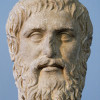“ For he who has beauty or good may desire more of them; and he who has beauty or good in himself may desire beauty and good in others. ”
Plato, Symposium. copy citation
| Author | Plato |
|---|---|
| Source | Symposium |
| Topic | beauty desire |
| Date | |
| Language | English |
| Reference | |
| Note | Translated by Benjamin Jowett |
| Weblink | http://www.gutenberg.org/files/1600/1600-h/1600-h.htm |
Context
“This piece of dialectics is ascribed to Diotima, who has already urged upon Socrates the argument which he urges against Agathon. That the distinction is a fallacy is obvious; it is almost acknowledged to be so by Socrates himself. For he who has beauty or good may desire more of them; and he who has beauty or good in himself may desire beauty and good in others. The fallacy seems to arise out of a confusion between the abstract ideas of good and beauty, which do not admit of degrees, and their partial realization in individuals.
But Diotima, the prophetess of Mantineia, whose sacred and superhuman character raises her above the ordinary proprieties of women, has taught Socrates far more than this about the art and mystery of love.”
source


